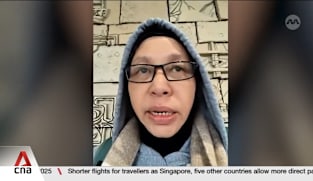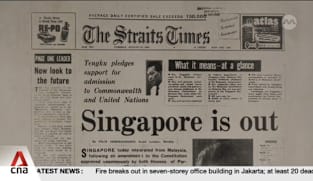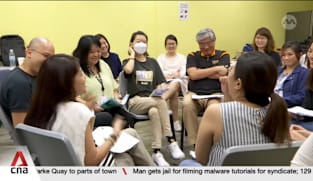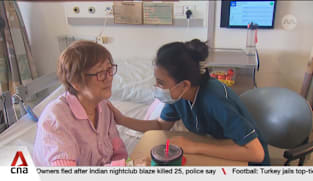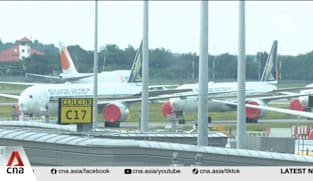Debate on President’s Address: Ong Ye Kung on Singapore’s preparations for 'super-aged' status and how the Government responds to concerns, differing views
Singapore will reach “super-aged” status in just three years, when the share of its population that is 65 and older hits 21 per cent. However, the Government has been preparing for this for a long time and has laid foundations so that Singapore is in a position to cushion the impact and perhaps even reap dividends, said Health Minister Ong Ye Kung. In Parliament on Thursday (Apr 20), he detailed five “enablers” for Singaporeans to live meaningful and happy lives at any age. First, with 80 per cent of the population living in public housing, HDB has played a central planning and development role to ensure that infrastructure is elder-friendly and communities are inclusive. Second, the economy is being adapted to an ageing population. Singapore has managed to grow its workforce despite its ageing society. This is due to factors such as Singaporeans being able to stay economically active for longer, having more women in the workforce and complementing local workers with foreign ones. The economy has also evolved to rely more on brains than brawn, augment human abilities with technology and drive growth through productivity improvements. Third, on retirement adequacy - the Government has introduced schemes such as CPF LIFE to address the challenge of differing life expectancies and Workfare to support those who do not save enough in their CPF accounts. Fourth, the healthcare system is being reformed. This includes the new preventive care strategy called Healthier SG and the next major area of priority which will be building up community care. Finally, preparing for ageing requires good governance, anticipatory policymaking and responsible stewardship of national resources, all of which are “the hallmark” of the Singapore Government, said Mr Ong. On that note, he responded to points made by opposition members of the House this week. Mr Leong Mun Wai had said the Progress Singapore Party’s (PSP) concerns and questions were often dismissed by the PAP Government and there were occasions when PSP was painted as “xenophobic, nativist and racist”. Mr Ong said the Government has always acknowledged concerns raised by Members of the House, including PSP, such as Singaporeans’ anxieties about competition for jobs and affordability of public housing. He said the Government is working hard to address these issues. However, he hoped Mr Leong would acknowledge the “serious concern” of the Government over the way he raises and debates issues. Mr Ong gave two examples in which he himself was personally involved - the debate on Singapore’s free trade agreement with India known as CECA, and Mr Leong’s allegation last year that school teachers were treating COVID-19-vaccinated and non-vaccinated students differently. Turning to Mr Leon Perera, Mr Ong said his assertion that the Government tries to push a “single dominant narrative” could not be true. If it was, there would not be such extensive debates on so many issues in Parliament. The minister said every political party will have its own dominant narrative as part of political contestation. He said the Government welcomes ideas and takes them into account where appropriate; when it has a different view, it explains why. Mr Ong said many ideas raised in Parliament, including by the Workers’ Party (WP), are “not fundamentally at odds with existing policies”. He noted that often, WP wants more of what is already being done but its “sums just do not add up”. Mr Ong explained that an alternate Budget without the GST is not a viable alternative and he reiterated why the Government will not agree to WP’s proposal to draw more from Singapore’s reserves.
Singapore will reach “super-aged” status in just three years, when the share of its population that is 65 and older hits 21 per cent. However, the Government has been preparing for this for a long time and has laid foundations so that Singapore is in a position to cushion the impact and perhaps even reap dividends, said Health Minister Ong Ye Kung. In Parliament on Thursday (Apr 20), he detailed five “enablers” for Singaporeans to live meaningful and happy lives at any age. First, with 80 per cent of the population living in public housing, HDB has played a central planning and development role to ensure that infrastructure is elder-friendly and communities are inclusive. Second, the economy is being adapted to an ageing population. Singapore has managed to grow its workforce despite its ageing society. This is due to factors such as Singaporeans being able to stay economically active for longer, having more women in the workforce and complementing local workers with foreign ones. The economy has also evolved to rely more on brains than brawn, augment human abilities with technology and drive growth through productivity improvements. Third, on retirement adequacy - the Government has introduced schemes such as CPF LIFE to address the challenge of differing life expectancies and Workfare to support those who do not save enough in their CPF accounts. Fourth, the healthcare system is being reformed. This includes the new preventive care strategy called Healthier SG and the next major area of priority which will be building up community care. Finally, preparing for ageing requires good governance, anticipatory policymaking and responsible stewardship of national resources, all of which are “the hallmark” of the Singapore Government, said Mr Ong. On that note, he responded to points made by opposition members of the House this week. Mr Leong Mun Wai had said the Progress Singapore Party’s (PSP) concerns and questions were often dismissed by the PAP Government and there were occasions when PSP was painted as “xenophobic, nativist and racist”. Mr Ong said the Government has always acknowledged concerns raised by Members of the House, including PSP, such as Singaporeans’ anxieties about competition for jobs and affordability of public housing. He said the Government is working hard to address these issues. However, he hoped Mr Leong would acknowledge the “serious concern” of the Government over the way he raises and debates issues. Mr Ong gave two examples in which he himself was personally involved - the debate on Singapore’s free trade agreement with India known as CECA, and Mr Leong’s allegation last year that school teachers were treating COVID-19-vaccinated and non-vaccinated students differently. Turning to Mr Leon Perera, Mr Ong said his assertion that the Government tries to push a “single dominant narrative” could not be true. If it was, there would not be such extensive debates on so many issues in Parliament. The minister said every political party will have its own dominant narrative as part of political contestation. He said the Government welcomes ideas and takes them into account where appropriate; when it has a different view, it explains why. Mr Ong said many ideas raised in Parliament, including by the Workers’ Party (WP), are “not fundamentally at odds with existing policies”. He noted that often, WP wants more of what is already being done but its “sums just do not add up”. Mr Ong explained that an alternate Budget without the GST is not a viable alternative and he reiterated why the Government will not agree to WP’s proposal to draw more from Singapore’s reserves.











